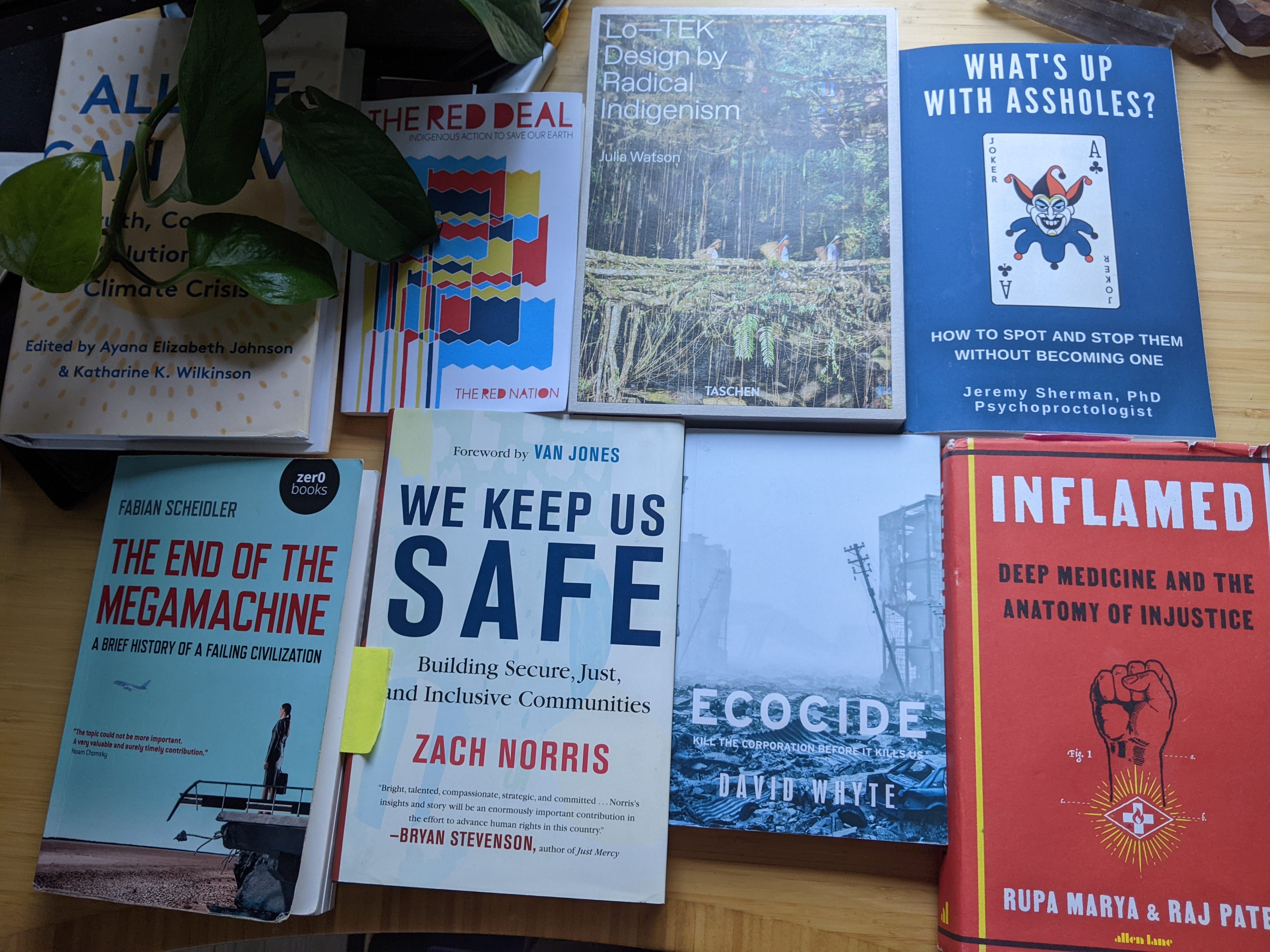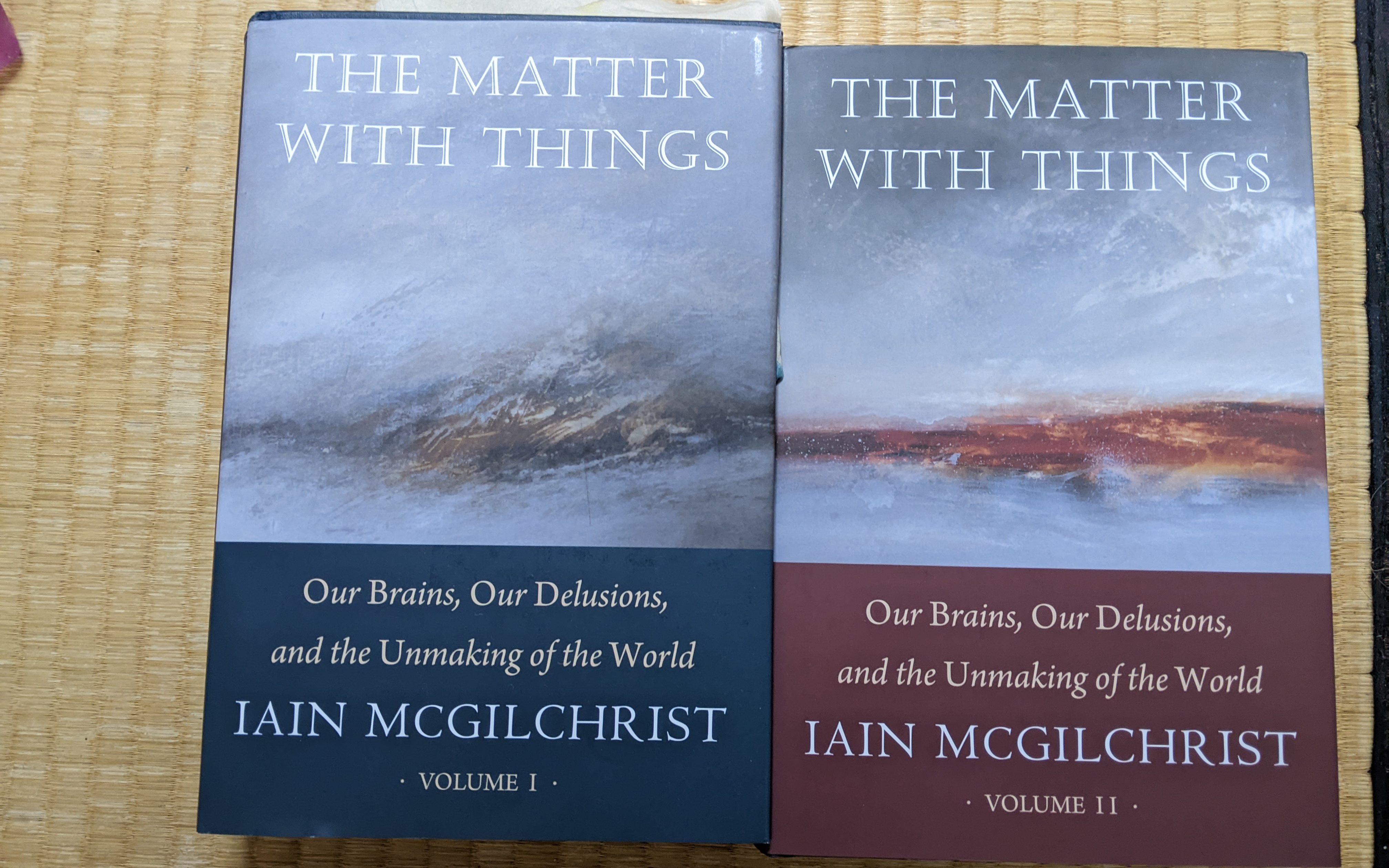
Of the academish books I enjoyed the most in 2021, these are among my favorites. Most of them have to do with systemic modes of looking at intractable or wicked problems, suggesting that wicked problems themselves are wicked only because of those factors or assumptions we refuse to bargain with. In other words, these books confront “sustaining the unsustainable” by making independent variables dependent. By removing, say, the sanctity or immortality of the corporation as an Archimedean point around which all policy must rotate, wicked problems don’t seem so wicked anymore, at least in the technical sense. Instead, the generative questions of how we build collective resiliency, and design our lives so we can organize with others to further decide what sort of practices we encourage and which we discourage, provides breathing room and empowerment to stop enabling ecocidal ideologies/epistemologies/theologies.
In no particular order, here are some of the books that helped me in my process of writing my own:
All We Can Save (edited by Ayana Elizabeth Johnson & Katharine K. Wilkinson) – (behind the plant)
This book is feminist environmentalism done right. It’s like coming home to that place beyond boyish techno-optimism or doomerist despair. It is paced, firm, and caring – for the earth, for each other, for the regular joys and tribulations of being alive during these times of megamachine-driven semiotic, social, and ecological breakdown. Both a sensuous and deeply personal and philosophical book. With the handy glossary modality it uses (underlying, dots, etc., to give you a full understanding of insider speak), it’s a great reference book too.
The Dawn of Everything (not pictured, by David Graeber and David Wendgrow)
This book I liked so much, I decided to launch a reading group on it (also as accountability to finish the thing). It’s main thesis is that the Enlightenment was indigenous-made, and that the Enlightenment in many ways was a counter-Enlightenment to deal with the philosophical issues of colonialism, and the novel arguments (to Europeans) of why European ways of domination were/are whack. Our received western idea that freedom isn’t free (to paraphrase a South Park movie), and that we need to accept various unfreedoms and lack of democracy to have democracy and freedom, the Davids show simply isn’t true. It’s a lack of imagination to think that politics, consciousness, and freedom develop monolithically in a way requiring structural (state and corporate) violence.
The Red Deal (by The Red Nation, an indigenous collective of anonymous scholars)
The Re(a)d Deal is the indigenous response to The Green (New) Deal, which never mentions indigenous rights nor the problem of corporate power. It is a treatise on decolonialization, written in a dense style, but at pamphlet length. It is raw, and doesn’t hold back; and, is one of the most sensible documents on what is necessary, and how to do it, to ensure a just transition away from domination/ecocide.
Lo-TEK: Design by Radical Indigenism (by Julia Watson)
In a world of cocaine-fueled hi-tec solutions, the careful architect Julia Watson scours the world for climate adaptations by indigenous communities. Necessity is the mother of invention, and indigenous peoples have already been enjoying for millennia ingenious ways of dealing with the extremes that climate change (or rather the megamachine) has rained down on us. Instead of high-flying dreams of hi-tec solutions that fail and then are abandoned, making habitats even less habitable (hello? World Bank projects?), Watson documents, in this beautiful book, living bridges, floating villages, and other indigenous applied science and architecture which would make whiny tech bros envious.
What’s Up with Assholes (by Jeremy Sherman)
This funny and heartfelt book tries to grapple with the question of how to live in a society with rentier-seekers without becoming one. How do we create society and not fall victim to the paradox of tolerance? And how do we discern assholes from people we don’t like? A punny, quote-worthy, but also serious exploration of how to deal with trolls of all sorts, from presidents, to billionaires, to bigots.
We Keep Us Safe (by Zach Norris)
Director of the Ella Baker Center in Oakland, Zach Norris’ book is a masterstroke, alone with the title, but certainly in view of the years of dedication and learning he has put in as a community organizer. Safety doesn’t come from above, or without, but through trust, care, intersectionality, and personal relationships. More social workers (properly coming from within the community working for and vetted by the community), less police killing kids! A great case study of how this actually works.
Ecocide (David Whyte)
Corporations are like giant squid. They eat everything they can get their hands on, spew ink everywhere to cover up their tracks, and lurk in the depths. So goes Whyte’s well-written and lay-accessable introduction to ecocide and corporate crime. A provocative title, but also a good read. We must change corporate structures and incentives – a rehaul of what we take to be corporations and the purpose of businesses – if we hope to translate all that empty rhetoric of CSR and net-zero by 2050 into a livable world.
Enflamed (Rupa Marya and Raj Patel)
Having worked with Rupa at UCSF in the Do No Harm Coalition which she started (with others), I was delighted but not surprised to see the breadth, depth, and radicality of this book. It addresses root causes, going through the entire body and our environments (the social determinants of health) through the trope of inflammation as a physical symptom/cause and righteous indignation at the causes. A must read for all those studying planetary health and decolonial health.

I also wanted to mention Iain McGilchrist’s new books – but I have not read them yet. Both are tomes of considerable heft (literally and figuratively). I intend to dive into them over the summer.
Also, a shout-out to Kim Stanley Robinson’s The Ministry for the Future. A considerable achievement. Especially the first half of the book I found enthralling, and I thoroughly enjoyed the story, imagination, iconoclasm, and worlding.